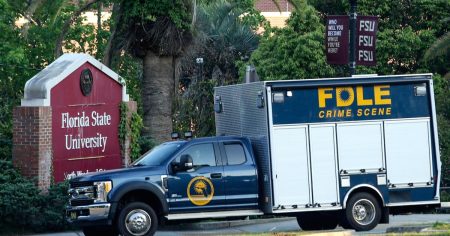Federal Funding Crisis Rocks Education and Science Research: A Nationwide Impact
A Shocking Discovery: The Sudden Defunding of Science Education
In a stunning turn of events, the director of a small regional science nonprofit encountered an alarming situation while attempting to pay bills last week. The organization had been awarded a nearly $1.5 million grant from the National Science Foundation (NSF) in the fall through the Racial Equity in STEM Education program to educate elementary and middle-school students about climate issues in the U.S. Gulf Coast. However, upon checking the NSF funding dashboard, the balance had mysteriously dropped to just $1. This incident is part of a larger pattern of funding disruptions affecting educators and researchers across the United States.
The Trump administration has intensified scrutiny over federal research grants and contracts, leading to significant cuts. On Monday, it was announced that dozens of contracts under the Institute of Education Sciences (IES), valued at an estimated $881 million, had been canceled. These contracts encompass nearly the entire research portfolio of the institute. Additionally, the NSF has begun reviewing billions of dollars in already-awarded grants, searching for keywords related to gender ideology, diversity, equity, and inclusion—themes opposed by the current administration.
Chaos and Uncertainty: The Impact on Education Research
The recent moves by the administration have created widespread uncertainty and fear within the education research community. Researchers with active projects are being forced to pause their work abruptly, unsure if or when their studies will resume. This disruption not only affects ongoing research but also casts a pall over future funding prospects, as many fear speaking out could jeopardize their chances of securing grants in the future. The situation has become so dire that a research director at a national nonprofit described the experience as “incredibly exhausting,” absorbing all of their time and resources.
The administration’s actions have been justified as an effort to align federal spending with its priorities and values. However, many in the education research community argue that these cuts target non-political, foundational research in critical areas such as math, literacy, school attendance, school quality, and student mental health. Robin Lake, director of the Center on Reinventing Public Education at Arizona State University, expressed her concerns, stating, “It’s hard to believe this administration is serious about stopping the alarming decline of U.S. student achievement and competitiveness when it puts the kibosh on federally funded research and access to data.”
The Broader Implications: A Threat to National Competitiveness
The cuts to federal research funding have far-reaching implications that extend beyond the immediate research community. Organizations like the Center on Reinventing Public Education rely on a broad national infrastructure of data, subject experts, and rigorous field studies to track pandemic recovery, study the impact of social media, and explore the effects of AI and school choice. The destruction of this infrastructure could cripple efforts to make American students competitive in the global economy. Ulrich Boser, CEO of The Learning Agency, likened the administration’s approach to remodeling a house by canceling all utility contracts, calling it “not a logical way of doing things. It’s just haphazard.”
The Learning Agency recently released a report warning that GOP-backed plans to shut down the Education Department could result in the loss or delay of more than $70 billion in funding for students. Boser also recalled the debacle with college aid, where attempts to redo a single financial assistance form caused massive delays, most harmful to the students who needed the assistance the most. He warned that gutting an entire Cabinet-level agency could have an even more devastating impact.
A Chilling Effect: Researchers Adapt to Survive
The NSF’s decision to review grant language for keywords related to diversity, equity, and inclusion has already started to affect researchers. An academic dean at a leading graduate school of education revealed that researchers are now reframing their funding proposals to avoid scrutiny or elimination based on a “Ctrl-F review” process. This approach involves quickly searching documents for specific keywords, a method that has become a source of anxiety for researchers. The dean stated, “I don’t think there’s an upside to the chaos and uncertainty that is being experienced in real time.”
The director of a research center focused on K-12 education reform described the administration’s actions as bringing turmoil to a community that typically performs non-ideological, empirical research on issues like literacy and math. He expressed confusion and concern about the potential chilling effect on education research, particularly in studying the outcomes of interventions on diverse student populations. “What ‘DEI’ means is really very ambiguous,” he said. “So if you are studying something and you look at differential outcomes between groups, is that DEI? I don’t know.”
A Man-Made Disaster: The Devastating Long-Term Consequences
The federal government funds billions of dollars in research each year for K-12 and higher education, but the current level of scrutiny is unprecedented. The leader of a nonprofit advocating for better education research described the situation as a “man-made disaster,” with scholars operating on grants through NSF, IES, and other agencies having no idea what’s happening. Many program officers have been put on administrative leave, leaving researchers in a state of confusion and uncertainty. This chaos creates a chilling effect for both current and future grantees.
Mike England, an NSF spokesman, stated that the agency is working to conduct a comprehensive review of its projects to ensure compliance with existing executive orders. However, the long-term impact of these actions could be devastating. A senior advisor to a research advocacy group compared the disruption to the COVID-19 pandemic, which shut many researchers out of schools for months, diluting the effectiveness of their research. “I just don’t want more asterisk years,” she said, referring to the need to insert asterisks in data for years when no information was available.
The leader of a nonprofit advocating for better education research described the situation as a “man-made disaster,” with scholars operating on grants through NSF, IES, and other agencies having no idea what’s happening. Many program officers have been put on administrative leave, leaving researchers in a state of confusion and uncertainty. This chaos creates a chilling effect for both current and future grantees. Researchers who have spent years building their careers may now be forced to walk away due to disrupted funding and restricted access to data. Amy O’Hara, a research professor at Georgetown University’s McCourt School for Public Policy, warned that removing data from public websites would have a chilling effect on what can be measured and what services can be delivered to communities. She expressed concerns about the uncertainty created at the collegiate graduate school level, as well as for early-career researchers. “If their funding is disrupted and their access to data is disrupted, they have an incentive to walk away,” she said. “And if they walk away and find other work to do, what is going to be compelling to bring them back?”
Robin Lake put it more bluntly: “I’m a very pragmatic researcher and I believe the feds could do much better in how they fund and support research. But a wholesale end to federal investment in education research feels like a cop-out. The hard but necessary work is making smarter investments.”
Conclusion: A Call to Action for Smarter Investments
The recent actions by the Trump administration have sent shockwaves through the education and science research communities, leaving many researchers and educators in a state of uncertainty and fear. While the administration may claim that these cuts are necessary to align federal spending with its priorities, the broader implications of these actions threaten the very foundation of education research and the competitiveness of American students in the global economy.
It is crucial for policymakers, educators, and researchers to come together to advocate for smarter investments in education research. As Robin Lake so aptly put it, the hard but necessary work is making smarter investments. The future of American students and the nation’s competitiveness in the global economy depend on it.









